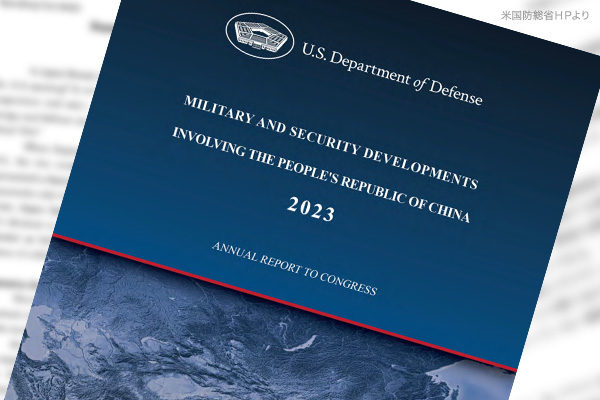On October 19, the U.S. Department of Defense released its annual report of Military and Security Developments involving the Peoples Republic of China. The media focused on its estimation that China possessed more than 500 nuclear warheads as of May 2023 and would have more than 1,000 by 2030 in efforts to beef up nuclear capabilities far faster than previous projections. However, when you read the report precisely, the noteworthy description is not limited to that.
Deployment of SLBMs to reach continental U.S. from Chinese sanctuaries
Although last year’s report only suggested that Jin-class strategic nuclear submarines (SSBNs) might have been armed with JL-3 new submarine-launched ballistic missiles (SLBMs), the latest report made clear that JL-3 deployment is in progress. The longer-range JL-3 can reach the continental U.S. from Chinese sanctuaries such as the Bohai Sea or the South China Sea, allowing China to dramatically strengthen its nuclear deterrence against the United States without risking Chinese SSBNs being detected by the West when entering the Pacific.
China is accelerating its nuclear arms expansion indifferent to the G7 (Group of Seven) Hiroshima Leaders’ Communiqué in May which said, “we express our commitment to achieving a world without nuclear weapons.” Japan’s neighboring countries doing so are not limited to China. North Korea has repeatedly conducted operational training for firing tactical nuclear missiles. Russia has not hesitated to threaten the use of nuclear weapons in the Ukraine War.
The U.S. Biden administration has cancelled its predecessor Trump administration’s decision to develop sea-launched nuclear cruise missiles (SLCM-N) program, which are extremely effective deterrence against tactical nuclear weapons of these countries. Can Japan fulfill its national defense simply by relying on the nuclear deterrence of the United States that has been forced to engage in two-front operations in Ukraine war and the recent Middle East crisis and has no spare energy? Although Japan’s National Security Strategy approved by the cabinet late last year still calls for adherence to the “three non-nuclear principles” of not possessing, not producing, and not permitting the introduction of nuclear weapons, the time has come to vitalize discussions about national defense without taboo.
Be alert to China’s influence and cognitive domain operations
Meanwhile, it is also noteworthy that the Pentagon report highlights “influence operations” in a prominent headline in a chapter dealing with the People’s Liberation Army (PLA)’s growing global presence. In last year’s report, influence operations were subtly treated as a subhead. The word “cognitive domain operations” appears in a headline this year, whereas it appeared only in the text last year.
Influence operations are designed to put other countries in a situation that is convenient for Chinese national policy. When Japan’s National Defense Strategy was being drafted last year, ruling Liberal Democratic Party proposed to describe China’s firing of ballistic missiles into Japan’s exclusive economic zone (EEZ) after U.S. House Speaker Nancy Pelosi’s visit to Taiwan as “taken as threats to Japan and local residents.” However, the pro-China Komeito, the LDP’s junior coalition partner, reportedly requested to delete “Japan and” and successfully persuaded the LDP to accept the request.
Cognitive domain operations aim at the psychological domination of other countries, with the goal of achieving victory without fighting. In the event of a Taiwan contingency, if Okinawa Prefecture were to raise a white flag, thinking it’s useless to fight against China, and resist the use of U.S. military bases by U.S. forces to support Taiwan, China would be able to advance its invasion of Taiwan advantageously.
China’s influence and cognitive domain operations against Japan is succeeding.
Fumio Ota is a Councilor and a Planning Committee member at the Japan Institute for National Fundamentals. He is a retired Vice Admiral of Japan Maritime Self-Defense Force and a former Director of Defense Intelligence Headquarters.


